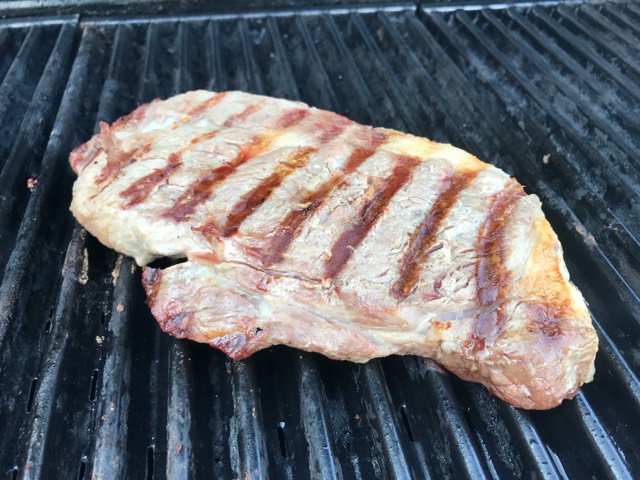Global company implements no-meat policy
WeWork bans meat at company events and for employees expensing meals. Here’s what’s wrong with that picture and why beef production is sustainable and good for the planet.
July 16, 2018

The beef industry has long been a scapegoat for global warming, climate change or any environmental woes we may be facing globally.
Eating a hamburger has been likened to driving a Hummer, and even though these claims have been refuted time and time again, the negative connotation has stuck. We are seeing these falsehoods repeated more frequently with the introduction of cell-cultured proteins (fake meats) into the marketplace, as it appears to be the strategies of these venture capitalists and chemists to disparage beef raised by traditional methods in order to sell their “frankenfibers.”
I’ll be addressing this hot topic tonight at the 2018 Agricultural Economic & Technology Summit in Kearney, Neb., which is hosted by the Nebraska Farm Bureau and the University of Nebraska-Lincoln Ag Economics and Biological Systems Engineering departments. If you’re in the area, be sure to attend! For complete event details, click here.
READ: We have met the enemy and its fake meats
Fake meats aside, the narrative surrounding beef and the environment is beyond frustrating, given that the U.S. beef industry has one of the lowest carbon footprints in the world, 10 to 50 times lower than some nations (per most recent beef checkoff research). In fact, greenhouse gas (GHG) emissions from cattle only account for 2% of U.S. GHG emissions whereas landfills emit 2.2%, transportation contributes 25.3%, electricity ranks at 29.7% and other sources (which could include everything from textiles to cell phones to salads) are 40.9%.
Despite this information, some companies are making it their official policies to police their employees and control what they consume while on the clock.
Most recently, WeWork, a company with 400 worldwide locations and 6,000 employees, has announced a new policy change that would prohibit employees from expensing any meals that contain red meat, pork or poultry. Yes, you read that right. If you are traveling on WeWork’s dollar, it’s tofu and salads only, or you pay for it out of your own pocket.
READ: 6 reasons we need grazing cattle
Additionally, WeWork will no longer serve meat at events or at its self-serve food kiosks.
"New research indicates that avoiding meat is one of the biggest things an individual can do to reduce their personal environmental impact, even more than switching to a hybrid car," WeWork co-founder Miguel McKelvey said in an email to staffers.
According to USA Today, “The company estimates its no-meat policy will save 15,507,103 animals by 2023, according to Business Insider, along with 16.6 billion gallons of water and 445.1 million pounds of carbon dioxide, the heat-trapping gas that alters Earth's climate.”
WeWork, like so many, has fallen trap to propaganda that turns a blind eye to real contributors of GHG emissions and places it squarely on ranchers’ shoulders.
Perhaps WeWork should consider this: Compared to 1977, today’s beef farmers and ranchers produce the same amount of beef with 33% fewer cattle. This has been accomplished through better animal health, handling, nutrition and genetics. What’s more, this improved efficiency means a 16% lower carbon footprint and far fewer natural resources used for every pound of beef produced, and in the U.S., we produce 18% of the world’s beef with only 8% of the world’s cattle.
READ: Research proves salads are more harmful to the environment than burgers
Environmental impact aside, not eating hamburgers will not magically save the planet. Even if WeWork employees go meatless, you can bet they’ll still use beef by-products throughout their day. And replacing meat with other foods will require grasslands to be tilled for crop farming, which results in damage to the ecosystem and wildlife habitat. While cattle may not die by going meatless, plenty of other animals will — mice, gophers, snakes, nesting birds, frogs, turtles, rabbits, foxes, bees and other insects, to name a few, will be impacted by the habitat loss of converting to a plant-based diet.
In other words, WeWork only looks foolish to create company-wide policies that nanny their employees and forcefully impose personal biases and misconceptions on the people who work for them. It also indicates that the beef industry has a clear public relations problem.
Unfortunately, these outright lies about beef in the diet are being accepted as truth. Nobody is going to debunk this information for us. We must loudly share the truth about cattle grazing and the environment with anyone who will listen. However, the truth isn’t sexy, and it isn’t headline grabbing, so we have our work cut out for us.
I challenge every reader to share one environmental fact about beef production on their social media pages this week. Let’s be part of the solution to balancing out the conversation. If we don’t, who will?
The opinions of Amanda Radke are not necessarily those of beefmagazine.com or Farm Progress.
About the Author(s)
You May Also Like




.png?width=300&auto=webp&quality=80&disable=upscale)
